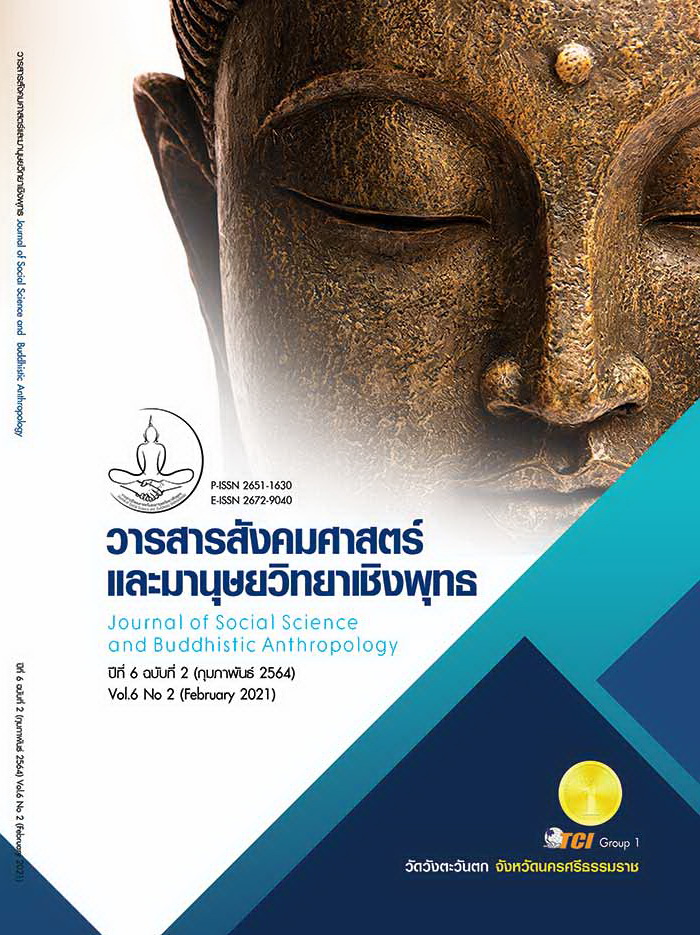LAW PROBLEMS RELATED TO MONKHOOD RENUNCIATION DUE TO OFFENSECRIMINAL LAW
Keywords:
Monkhood Renunciation, Criminal Action, Sangha ActAbstract
The objectives of this article were to: 1) study the principles concepts and law theories about monkhood renunciation due to offense criminal law and the Sangha Act of foreign countries, 2) study legal measures relating to monkhood renunciation due to offense criminal law and the Sangha Act of foreign countries and Thailand, and 3) suggest suitable solutions of Thailand, legislation to protect Buddhism in order to be able to solve the problem sustainably. This research was a qualitative research use interviews and group discussions by choose specific examples that divided into 5 groups such as 1) the judge 2) attorney 3) police 4) lawyer and 5) monk from all 10 persons by using content analysis and summarizing as an overview. The research found that: 1) concept and theory about the related on the monkhood renunciation such as: 1.1) discipline used to control the behavior of the Buddhist Monk’s, 1.2) criminal allegations and disciplinary violations of the law of discipline and acts of criminal legal, 1.3) consequences of the Buddhist Monk’s and secularism in the law, and 1.4) legal criminal rules for determining offenses and imposing penalties. 2) legal related on the monkhood renunciation such as the Sangha Act, Criminal code and Constitution of the kingdom of Thailand. And 3) the solution is section 29 to prevent the investigative staff from exercising its sole discretion. But should require that the Buddhajaks have to come to take over and take over and investigate to be evident in order to judge the punishment according to the dharma. And section 30 in the event of a court order of imprisonment, only the offending Buddhist Monk’s. or a criminal conviction. And set up a discipline court.
References
เกษม ประพาน. (2559). การบังคับใช้พระราชบัญญัติคณะสงฆ์ไทย พ.ศ. 2505 (แก้ไขเพิ่มเติม พ.ศ. 2535) เกี่ยวเนื่องกับกฎหมายฝ่ายบ้านเมือง. ใน วิทยานิพนธ์รัฐศาสตรมหาบัณฑิต สาขาวิชาการปกครอง. มหาวิทยาลัยมหามกุฏราชวิทยาลัย วิทยาเขตศรีล้านช้าง.
เจ้าคณะสงฆ์รูปที่ 2. (9 มีนาคม 2563). ปัญหาทางกฎหมายเกี่ยวกับการสละสมณเพศของพระภิกษุซึ่งต้องหาว่ากระทำความผิดอาญา. (พระครูวินัยธรสุริยา สุริโย (คงคาไหว), ผู้สัมภาษณ์)
ณัฐพงษ์ สังข์กลิ่นหอม. (2556). วิถีธรรมวิถีไทย. กรุงเทพมหานคร: วิทยาลัยเทคโนโลยีตั้งตรงจิตรบริหารธุรกิจ.
ทนายความคนที่ 1. (14 มีนาคม 2563). ปัญหาทางกฎหมายเกี่ยวกับการสละสมณเพศของพระภิกษุซึ่งต้องหาว่ากระทำความผิดอาญา. (พระครูวินัยธรสุริยา สุริโย (คงคาไหว), ผู้สัมภาษณ์)
ไทยรัฐ ออนไลน์. (2563). อุทธรณ์ยกฟ้อง พระพรหมดิลกกับเลขาเจ้าคณะ. เรียกใช้เมื่อ 14 สิงหาคม 2563 จาก https://www.thairath.co.th/news/local/bangkok /1935879
บุญชม ศรีสะอาด. (2556). วิธีการทางสถิติสำหรับการวิจัย เล่ม 1. (พิมพ์ครั้งที่ 5). กรุงเทพมหานคร: สุวีริยาการพิมพ์.
ผู้พิพากษาคนที่ 1. (9 มีนาคม 2563). ปัญหาทางกฎหมายเกี่ยวกับการสละสมณเพศของพระภิกษุซึ่งต้องหาว่ากระทำความผิดอาญา. (พระครูวินัยธรสุริยา สุริโย (คงคาไหว), ผู้สัมภาษณ์)
พระพรหมคุณาภรณ์ (ป.อ. ปยุตฺโต). (2555). นิติศาสตร์แนวพุทธ. (พิมพ์ครั้งที่ 13). กรุงเทพมหานคร: วิญญูชน.
พระมหาสมบัติ มูลศิริ. (2561). ปัญหาทางกฎหมายเกี่ยวกับมาตรการลงโทษข้อบังคับพระภิกษุสงฆ์สละสมณเพศตามมาตรา 29 ตามพระราชบัญญัติคณะสงฆ์ พ.ศ. 2505. ใน วิทยานิพนธ์นิติศาสตรมหาบัณฑิต สาขาวิชานิติศาสตร์. มหาวิทยาลัยปทุมธานี.
พระราชบัญญัติคณะสงฆ์ พุทธศักราช 2484. (2548). ราชกิจจานุเบกษา เล่มที่ 58 ตอนที่ 1391 (14 ตุลาคม 2548).
พระสิทธินิติธาดา (พันตำรวจโท ชลัช โชติทตฺโต พรหมะวัน). (2555). การลงโทษพระภิกษุ กรณีเสพเมถุน: ศึกษาเปรียบเทียบโทษทางพระธรรมวินัยและทางอาญาเชิงประวัติศาสตร์และพัฒนาการทางเลือก. วารสารวิชาการมหาวิทยาลัยปทุมธานี, 4(3), 8-20.
มหาจุฬาลงกรณราชวิทยาลัย. (2539). พระไตรปิฎกฉบับภาษาไทยมหาจุฬาลงกรณราชวิทยาลัย. กรุงเทพมหานคร: โรงพิมพ์มหาจุฬาลงกรณราชวิทยาลัย.
รุจิระ บุนนาค. (22 มิถุนายน 2561). คดีอาญากับการสละสมณเพศ. หนังสือพิมพ์แนวหน้า, หน้า 14.
สมชาย บุญคงมาก และภูภณัช รัตนชัย. (2561). ปัญหาการสละสมณเพศของพระภิกษุตามพระราชบัญญัติคณะสงฆ์ พ.ศ. 2505: ศึกษากรณีการใช้อำนาจดุลยพินิจของเจ้าหน้าที่ของรัฐในกระบวนการยุติธรรม. วารสารมนุษยศาสตร์และสังคมศาสตร์ นายเรืออากาศ, 6 (ธันวาคม 2561), 11-24.
แสวง อุดมศรี. (2539). การปกครองคณะสงฆ์ไทย. กรุงเทพมหานคร: โรงพิมพ์จุฬาลงกรณ์ราชวิทยาลัย.
Cronbach, L. J. (1990). Essentials of psychological testing (5th ed.). New York: Harper Collins. Publishers.









